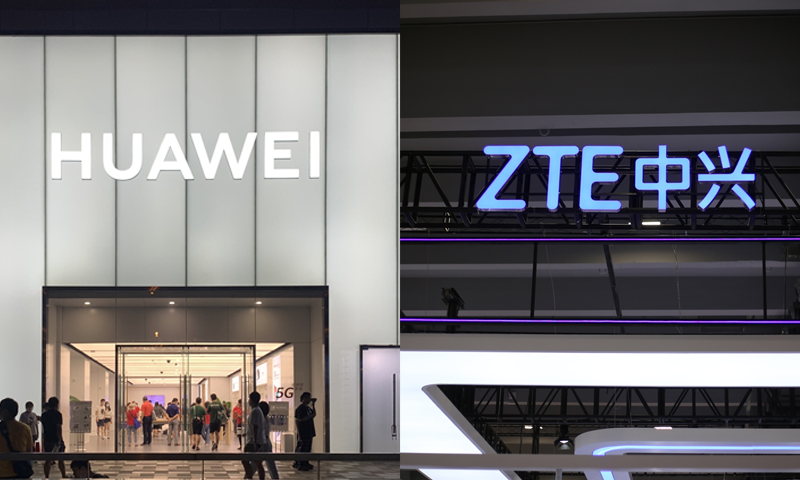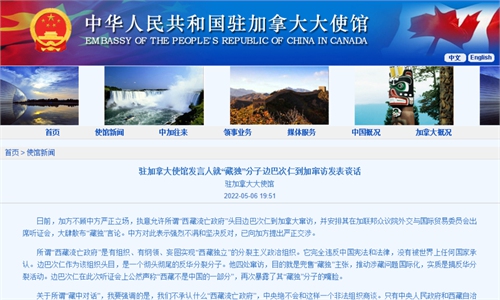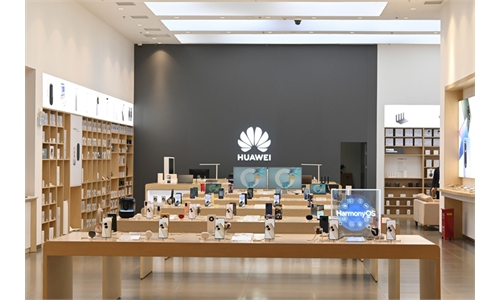Update: China vows 'all necessary measures' after Ottawa moves to ban 5G gear from Huawei, ZTE

Huawei and ZTE. Photo: VCG
China's foreign ministry and commerce ministry on Friday vowed all necessary measures to safeguard the legitimate interests of Chinese firms, after Canada revealed plans to ban the use of 5G gear from Huawei and ZTE on so-called national security grounds.
The 5G ban targeting Chinese firms, coming on the heels of a gesture of goodwill from China which lifted a three-year ban on Canadian canola seeds, lays bare Ottawa's role as a political pawn of the US, experts said, viewing Ottawa's unwise action as sowing the seeds of uncertainty over China-Canada cooperation.
Canada's move utterly violates market economy and free trade rules and grossly damages the rights and interests of Chinese firms, Foreign Ministry Spokesperson Wang Wenbin told a regular press conference on Friday.
China will assess the incident in a comprehensive and solemn manner and will take any measures necessary to safeguard the legitimate rights and interests of Chinese businesses, according to Wang.
In a similarly toned statement on Thursday, the Chinese Embassy in Canada said China expressed grave concern over and strongly condemned the Canadian government's ban, citing an embassy spokesperson.
The Canadian government's ban announcement is "a wrong decision and sends a wrong signal," a spokesperson for the Ministry of Commerce (MOFCOM) said in a statement on Friday.
The Canadian move, in violation of market economy and free trade rules, is detrimental to the commercial interests of relevant Chinese and Canadian firms, endangers optimism among businesses from the two countries on reciprocal partnerships, and would create an unfavorable impact on China-Canada economic and trade relations, the MOFCOM spokesperson said.
The commerce ministry urged Canada to view its cooperation with China in an objective and reasonable way and immediately stop wrongdoings.
"China will evaluate the impact on Chinese firms of the Canadian government's decision and will reserve the right to take necessary measures."
"This is an unfortunate political decision that has nothing to do with cybersecurity or any of the technologies in question," Huawei Canada said in a statement the Global Times obtained on Friday.
"Huawei equipment, including both hardware and software, has been routinely and closely scrutinized by the government and its security agencies according to stringent quality standards. There have been zero security incidents caused by Huawei equipment throughout this entire period.
"We are proud of our security record in Canada," the company said, noting that banning its equipment and services will lead to significant losses in Canada and push up the cost of communications for Canadian consumers.
The company vowed to do everything in its capacity to protect the legitimate rights and interests of its customers, partners, and itself.
In a statement sent to the Global Times on Friday, ZTE said it's "aware of the regrettable announcement by the Canadian government."
"We reject the premise of this announcement, which is highly speculative," read the ZTE statement.
"In developing and implementing our telecommunications infrastructure and services, we have always abided by international standards and best practices, opening up our cybersecurity labs to enable regulators and stakeholders to verify the security of ZTE products. We look forward to continuing to do so," the company said.
"The government intends to prohibit the inclusion of Huawei and ZTE products and services in Canada's telecommunications systems," Canadian Minister of Innovation, Science and Industry Francois-Philippe Champagne said in a statement Thursday.
"This follows a thorough review by our independent security agencies and in consultation with our closest allies.
"As a result, telecommunications companies that operate in Canada would no longer be permitted to make use of designated equipment or services provided by Huawei and ZTE. As well, companies that already use this equipment installed in their networks would be required to cease its use and remove it," the Canadian minister said, citing alleged safety and security concerns.
The planned prohibition seems bewildering as the Canadian government announced China's removal of a ban on Canadian canola seeds only a day earlier.
"China has reinstated access to its market for two Canadian companies that China Customs had suspended from exporting canola seed to China since March 2019," Canadian Trade Minister Mary Ng and Agriculture Minister Marie-Claude Bibeau disclosed in a joint statement on Wednesday. The canola sector contributes roughly $27 billion and 250,000 jobs to Canada's economy, read the statement.
The Chinese market purportedly accounted for 40 percent of Canada's canola exports prior to the trade tensions.
"The telecom ban is quite unwise, a conspicuous indication that Ottawa sits tight in the US-led grouping instead of acting independently for its own interests," Bai Ming, deputy director of the International Market Research Institute at the Chinese Academy of International Trade and Economic Cooperation, told the Global Times on Friday.
Cooperation with China would surely benefit Canada, especially after China signaled that a bilateral tie-up would be in the interests of both sides, Bai said.
Canada has long been considered a pawn of the US, he went on to say, noting that some countries may have played Canada off against China.
In so doing, Canada, disregarding its true interests, is sowing the seeds of uncertainty over its partnership with China, the expert emphasized.
"Both Canada and China have sectors that are restricted to foreign participation. We encourage Canada and China to maintain perspective, and delineate between these areas of concern and the rest of our fair, open and robust trade and investment relationship. Companies that are operating in safe spaces should continue to be able to do so unabated," Noah Fraser, managing director and chief representative of the Canada China Business Council (CCBC) in China, told the Global Times on Friday.
"Canada and China have deep economic ties and complementarities, especially in areas like agri-business, financial services, natural resources and education, and we should use our business community as a channel for improved bilateral cooperation and collaboration to avoid future setbacks," Fraser said.
The Thursday decision put Canada in line with the other four members of the Five Eyes intelligence alliance that have moved to prohibit or restrict Huawei's access to their 5G networks. The Five Eyes comprises Canada, the US, Australia, New Zealand and the UK.
The Chinese government has long required Chinese firms to carry out outbound economic cooperation on the basis of abiding by international rules and local laws, according to the spokesperson for the Chinese Embassy in Canada.
"Huawei and ZTE have always kept very good cybersecurity records. Canada's decision to exclude relevant Chinese firms from its market without any conclusive evidence and on so-called national security grounds is seriously generalizing the concept of national security," the embassy spokesperson said.
This violates market economy and free trade rules, and it also damages the legitimate rights and interests of Chinese firms, the spokesperson continued, denouncing Canada's claims that the ban was in consultation with its allies as proof that Ottawa acts in concert with Washington to crack down on Chinese firms.
"Canada's so-called 'security' consideration is nothing but an excuse for political maneuvers," the spokesperson said, stressing that Canada's wrongdoing will surely harm its international image and interests.


